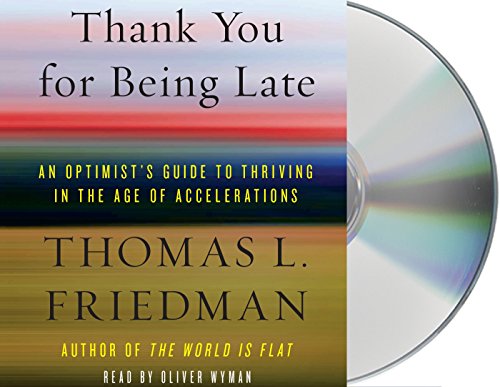
A field guide to the twenty-first century, written by one of its most celebrated observers
We all sense it―something big is going on. You feel it in your workplace. You feel it when you talk to your kids. You can’t miss it when you read the newspapers or watch the news. Our lives are being transformed in so many realms all at once―and it is dizzying.
In Thank You for Being Late, a work unlike anything he has attempted before, Thomas L. Friedman exposes the tectonic movements that are reshaping the world today and explains how to get the most out of them and cushion their worst impacts. You will never look at the world the same way again after you read this book: how you understand the news, the work you do, the education your kids need, the investments your employer has to make, and the moral and geopolitical choices our country has to navigate will all be refashioned by Friedman’s original analysis.
Friedman begins by taking us into his own way of looking at the world―how he writes a column. After a quick tutorial on that subject, he proceeds to write what could only be called a giant column about the twenty-first century. His thesis: to understand the twenty-first century, you need to understand that the planet’s three largest forces―Moore’s law (technology); the Market (globalization); and Mother Nature (climate change and biodiversity loss)―are accelerating all at once. These accelerations are transforming five key realms: the workplace, politics, geopolitics, ethics, and community.
Why is this happening? As Friedman shows, the exponential increase in computing power defined by Moore’s law has a lot to do with it. The year 2007 was a major inflection point: the release of the iPhone, together with advances in silicon chips, software, storage, sensors, and networking, created a new technology platform. Friedman calls this platform “the supernova”―for it is an extraordinary release of energy that is reshaping everything from how we hail a taxi to the fate of nations to our most intimate relationships. It is creating vast new opportunities for individuals and small groups to save the world―or to destroy it.
Thank You for Being Late is a work of contemporary history that serves as a field manual for how to write and think about this era of accelerations. It’s also an argument for “being late”―for pausing to appreciate this amazing historical epoch we’re passing through and reflecting on its possibilities and dangers. To amplify this point, Friedman revisits his Minnesota hometown in his moving concluding chapters; there, he explores how communities can create a “topsoil of trust” to anchor their increasingly diverse and digital populations.
With his trademark vitality, wit, and optimism, Friedman shows that we can overcome the multiple stresses of an age of accelerations―if we slow down, if we dare to be late and use the time to reimagine work, politics, and community. Thank You for Being Late is Friedman’s most ambitious book―and an essential guide to the present and the future.

No, It’s Not Going to Be O.K. Friedman writes a usually excellent New York Times column about foreign affairs. However, when he moves into areas such as economics (eg. supporting globalization – despite the obvious detrimental impact on the U.S.), technology, and sometimes politics, the quality drops considerably. Unfortunately, this book is mostly about issues other than foreign affairs, though that is not to say he has nothing worthwhile to say. However, his basic message – ‘That it is going to be O.K.’ remains to be…
Friedman’s 3rd Seminal Work I had one of those nights where too many ideas prevented me to sleep. I had pre-ordered Friedman’s new book and it was now available, so I started in. I have not endorsed all of his books, but two profoundly impacted me. Lexus and the Olive Tree and World is Flat are seminal. After racing through the beginning, I can tell this one will be as well.
A Clear Explanation of How We Got to Where We Are Friedman offers a compelling, well-researched paradigm for understanding how the US arrived at its current level of dysfunctional politics. His hypothesis, restated throughout the book is that the US, as well as the rest of the planet, is being subjected to three relentless, ineluctable forces: the exponential development of technology, the forces of globalization and concomitant interdependence, and severe climate change, all of which have altered forever the complacent stability to which we…